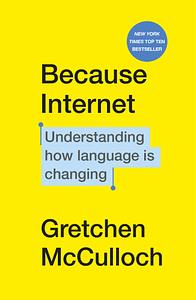Take a photo of a barcode or cover
informative
reflective
medium-paced
Very interesting but also drags a lot. I kept losing focus though
When I first assigned this to my editing/publishing class, the students admitted they found it ridiculous because they already "knew" the internet and how to text. By the end of the book, however, many were pleasantly surprised by how little thought they'd put into a medium they spend most of their days on.
McCulloch--a self-described internet linguist--takes a topic that reflects more than "just the internet." Instead, she shows how the internet (e.g., Twitter, texting, memes, emoji, gifs) is changing our language and, even more, how language is *always* changing and how it reflects who we are in the certain moment. It also encourages all of us to step away from the idea that Standard English is the only way we should be speaking, as McCulloch discusses different audiences and how we adapt to fit into each one. One of my students came to realize why her text recipients found her tone "cold"--it was because she was using Standard English and not recognizing her audiences' needs and the natural ways in which that student speaks.
I've now assigned this to two classes and will be assigning it to another next spring. A fascinating--and fun--read. I highly recommend the chapters on emoji and typographical tone of voice.
McCulloch--a self-described internet linguist--takes a topic that reflects more than "just the internet." Instead, she shows how the internet (e.g., Twitter, texting, memes, emoji, gifs) is changing our language and, even more, how language is *always* changing and how it reflects who we are in the certain moment. It also encourages all of us to step away from the idea that Standard English is the only way we should be speaking, as McCulloch discusses different audiences and how we adapt to fit into each one. One of my students came to realize why her text recipients found her tone "cold"--it was because she was using Standard English and not recognizing her audiences' needs and the natural ways in which that student speaks.
I've now assigned this to two classes and will be assigning it to another next spring. A fascinating--and fun--read. I highly recommend the chapters on emoji and typographical tone of voice.
Insights Galore
An enjoyable read, filled from beginning to end with insights, and for myself, providing some insights about generational differences, along with details about usage that I was only superficially familiar.
An enjoyable read, filled from beginning to end with insights, and for myself, providing some insights about generational differences, along with details about usage that I was only superficially familiar.
There is something uniquely wonderful about listening to an audiobook describing the evolution of a primarily character/text-based form of communication.
I mean, have you really lived until you've listened to an author verbalize askdlfjasdlij vs. mmiurpqiwoer and finally explain why one looks "right" and the other just... so clearly isn't.
There's definitely some strange dissonance going on in my mind reading about things that I did--hi, friends that I met on Neopets in middle school/early high school and later went on to visit in real life---or have wondered about--what's with all the lowercase titles that consist of a dramatic phrase (partitioned via custom parenthetical) in all that fanfic I may or may not spend too much time reading, anyway? An
Anyway. I don't know much about linguistics, but I feel like I'm suddenly going to be much more aware of how I speak/type in the near future because of this book. Regardless, a fun listen.
I mean, have you really lived until you've listened to an author verbalize askdlfjasdlij vs. mmiurpqiwoer and finally explain why one looks "right" and the other just... so clearly isn't.
There's definitely some strange dissonance going on in my mind reading about things that I did--hi, friends that I met on Neopets in middle school/early high school and later went on to visit in real life---or have wondered about--what's with all the lowercase titles that consist of a dramatic phrase (partitioned via custom parenthetical) in all that fanfic I may or may not spend too much time reading, anyway? An
Anyway. I don't know much about linguistics, but I feel like I'm suddenly going to be much more aware of how I speak/type in the near future because of this book. Regardless, a fun listen.
This book is very cool and very interesting, I love language in the way that I love paying attention to how I speak and how my friends speak and how we pick up words/phrases from each other (and tiktok and the internet), and a lot of this book was just a big callout to stuff I’ve already noticed or that I do (the obvious but undefined differences between how different people I know text, how emojis are used as gestures, ways of conveying sarcasm like “scare quotes”, Ironic Capitals, ~tildes~, and ✨sparkle emojis✨) which was so so interesting but also hey stop that /j
Ugh now I’m never gonna be able to stop thinking about how I text / write informally ever again lol
Oh tone tags weren’t really talked about, ‘lol’ as a marker of lightheartedness was talked about and I feel like it acts similar to a tone tag, but maybe tone tags aren’t/weren’t quite widespread enough to make it into this book (it was published July 2019, I think I mainly started using tone tags when other people started using them in a discord server I’m in around early 2021 maybe?)
Ugh now I’m never gonna be able to stop thinking about how I text / write informally ever again lol
Oh tone tags weren’t really talked about, ‘lol’ as a marker of lightheartedness was talked about and I feel like it acts similar to a tone tag, but maybe tone tags aren’t/weren’t quite widespread enough to make it into this book (it was published July 2019, I think I mainly started using tone tags when other people started using them in a discord server I’m in around early 2021 maybe?)
An excellent book! Gretchen McCulloch explores the fascinating world of internet language. She's particularly good at explaining large, complex concepts with simple metaphors, and she sheds lights on questions that have plagued both internet & non-internet people alike. I'm particularly fond of the topic she calls "typographic tone of voice" - that is, using punctuation & capitalization to indicate how you feel.
From the outset it was pretty clear that this was a book written for me. It does a great job of going through the history of online language and how written language isn’t in fact in danger “because internet” but how this is the first time in the history of the written language that we see casual written language that was previosly only limited to the backs of postcards.
The book has a well-researched history of online writing and shows how one’s approach to online writing depends on when one entered the cyberspace, already back in the BBS days or after the smartphones.
The book has a well-researched history of online writing and shows how one’s approach to online writing depends on when one entered the cyberspace, already back in the BBS days or after the smartphones.
informative
medium-paced




